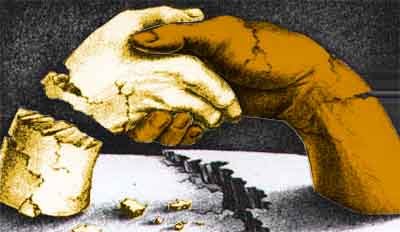|
|

|
|
|

|

By Andrew A. Buerger
UNCLE TONY JOINS our family seder every year at the Gubens' house. Tony's not really my uncle. I call him "uncle" because he looks a lot like my father — except for the fact he's African-American — and
because they were very close friends.
Despite not being Jewish, Tony Hawkins can hold his own throughout the seder. His only faux pas I can recall was when he asked someone to please pass him the wasabi for his gefilte fish. Any sushi lover could confuse wasabi with horseradish.
A few years ago, Uncle Tony was reading a passage about G-d delivering His people from slavery. I realized how much a seder could help any people that had suffered the devastation of slavery. As Uncle Tony says: "The blacks have not had a funeral for our slavery; Jews have one every year."
How cathartic would it be to use a Passover seder to compare notes with other people, to tell them: "Don't ever forget the bitterness of slavery. But at the same time, let's treasure our freedom and work for the freedom of others"?
"We are a people of martyrology," Ed Serrota reminded me. A photojournalist who has documented the devastation of the Bosnian war, Mr. Serrota spoke to a small group in Baltimore recently. He said we spend most of our resources to memorialize our pain rather than celebrate our successes. Mr. Serrota added: "When we say 'Never Again!'
we are referring to not letting bad things happen to Jews." We are slower to react to non-Jews in trouble.
He's right. We work hard to make sure that we're known as the most victimized people. A few months ago, Jewish groups actually fought black groups over the word "holocaust." Jewish groups claimed that applying
the word to black slavery was denigrating the Jewish Holocaust. A sick debate ensued about who suffered more: Jews during WWII or blacks during slavery.
Last month, Jewish groups got angry again, this time at
Japanese-Americans for using the term "concentration camp" to apply to their internment by the US during WWII. Why do we have to compete with others who have suffered to show that ours is worse?
Instead, let's compete to be the most compassionate, the quickest to respond to world tragedies, the best at helping other people heal. Let's stop marketing ourselves as a people of martyrology and revive the old
marketing campaign of being the Chosen People.
We have a lot to teach the world about how to overcome pain. And, the world has a lot to teach us. If we understood each other better, we wouldn't have to get into a debate over whose suffering is worse. Rather, we would discuss traditions in our culture that soothe our pain.
Inviting a "stranger" to your seder would be — like it says on the stern of Uncle Tony's boat — dayenu, enough.
But rather than be paternalistic, I will make a point of attending a cultural event in Uncle Tony's community. I hope that I can learn more about myself through him. As long as he doesn't tell stories of my faux
Andrew A. Buerger is publisher of the Baltimore Jewish Times.